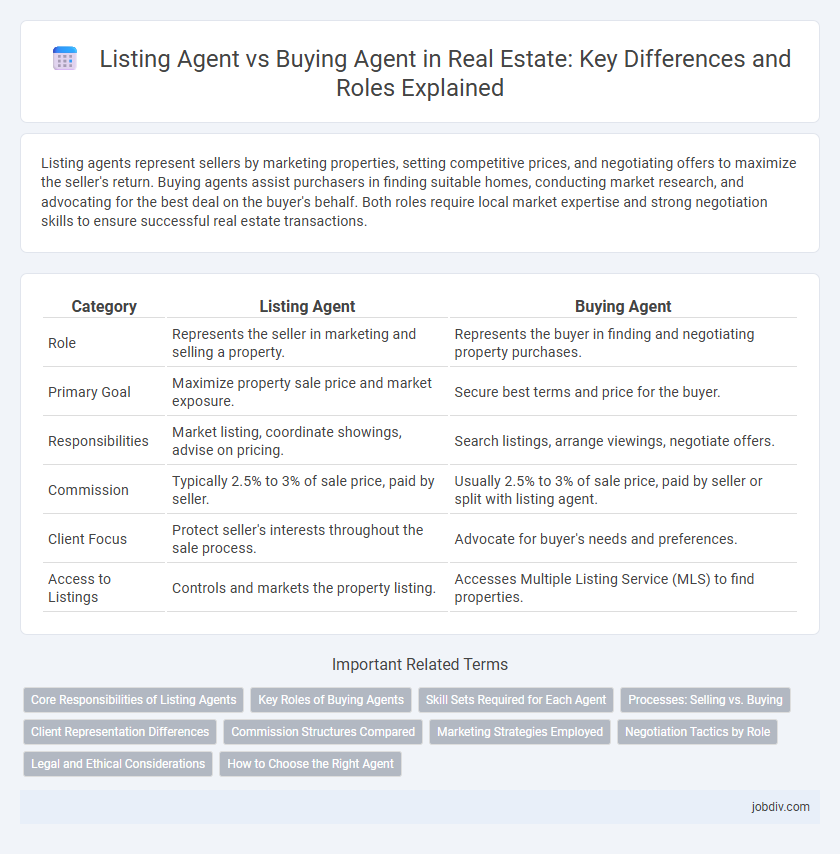Listing agents represent sellers by marketing properties, setting competitive prices, and negotiating offers to maximize the seller's return. Buying agents assist purchasers in finding suitable homes, conducting market research, and advocating for the best deal on the buyer's behalf. Both roles require local market expertise and strong negotiation skills to ensure successful real estate transactions.
Table of Comparison
| Category | Listing Agent | Buying Agent |
|---|---|---|
| Role | Represents the seller in marketing and selling a property. | Represents the buyer in finding and negotiating property purchases. |
| Primary Goal | Maximize property sale price and market exposure. | Secure best terms and price for the buyer. |
| Responsibilities | Market listing, coordinate showings, advise on pricing. | Search listings, arrange viewings, negotiate offers. |
| Commission | Typically 2.5% to 3% of sale price, paid by seller. | Usually 2.5% to 3% of sale price, paid by seller or split with listing agent. |
| Client Focus | Protect seller's interests throughout the sale process. | Advocate for buyer's needs and preferences. |
| Access to Listings | Controls and markets the property listing. | Accesses Multiple Listing Service (MLS) to find properties. |
Core Responsibilities of Listing Agents
Listing agents specialize in marketing properties, pricing homes strategically based on market analysis, and coordinating showings to attract qualified buyers. They manage negotiations and contracts on behalf of the seller to secure optimal sale terms while ensuring compliance with local real estate regulations. Effective communication with both sellers and potential buyers is essential to facilitate smooth transaction processes and timely closings.
Key Roles of Buying Agents
Buying agents specialize in representing the buyer's interests by conducting market research, identifying suitable properties, and negotiating purchase terms to secure the best deal. They provide expert guidance on pricing, property conditions, and financing options, ensuring buyers make informed decisions throughout the transaction. Their key roles include coordinating property viewings, managing offer submissions, and facilitating communication between buyers, sellers, and mortgage lenders.
Skill Sets Required for Each Agent
Listing agents require expertise in market analysis, pricing strategy, and marketing tactics to effectively promote properties and attract potential buyers. Buying agents must excel in negotiation, property evaluation, and client representation to identify suitable homes and secure favorable purchase terms. Both roles demand strong communication skills, local market knowledge, and an understanding of real estate contracts.
Processes: Selling vs. Buying
Listing agents coordinate property marketing, pricing strategies, and seller negotiations to optimize property visibility and attract qualified buyers. Buying agents focus on researching market options, scheduling property tours, and negotiating purchase terms to secure favorable deals for buyers. Both agents facilitate contract processes, inspections, and closing procedures tailored to their clients' roles, ensuring smooth real estate transactions.
Client Representation Differences
Listing agents represent sellers, managing property marketing, pricing strategies, and negotiations to maximize the sale value. Buying agents focus on assisting buyers by identifying suitable properties, conducting market analysis, and advocating for the best purchase terms. The key client representation difference lies in loyalty and fiduciary duties: listing agents prioritize seller interests, while buying agents are committed exclusively to protecting buyer interests throughout the transaction.
Commission Structures Compared
Listing agents typically earn a commission ranging from 5% to 6% of the home's sale price, which is then split with the buyer's agent, commonly resulting in each agent receiving 2.5% to 3%. Buyers' agents rely on this commission split as their primary compensation, whereas some buyer agents might negotiate a buyer rebate or fee-based services in competitive markets. Commission structures vary by region and brokerage, influencing negotiation strategies and overall transaction costs for both sellers and buyers.
Marketing Strategies Employed
Listing agents utilize targeted digital marketing campaigns, including high-quality photography and virtual tours, to attract potential sellers and showcase properties effectively. Buying agents focus on personalized outreach strategies, utilizing client databases and neighborhood market analysis to find optimal listings aligned with buyer preferences. Both agents leverage social media platforms and email marketing to enhance visibility and client engagement throughout the transaction process.
Negotiation Tactics by Role
Listing agents leverage their deep knowledge of seller motivations and market conditions to set strategic asking prices and field multiple offers, often creating competitive bidding environments that maximize seller profit. Buying agents focus on identifying seller flexibility points and potential property issues to negotiate price reductions, repair credits, or favorable contract terms, ensuring optimal value for the buyer. Both roles utilize tailored negotiation tactics, with listing agents prioritizing seller advantage and buying agents emphasizing buyer protection and cost savings.
Legal and Ethical Considerations
Listing agents and buying agents must adhere to distinct legal and ethical obligations that protect client interests and ensure transparent transactions. Listing agents are legally bound to disclose all material facts about the property, while buying agents must diligently represent the buyer's best interests, including conducting thorough due diligence. Both types of agents are required to maintain confidentiality, avoid conflicts of interest, and comply with state real estate laws and professional codes of ethics such as those outlined by the National Association of Realtors (NAR).
How to Choose the Right Agent
Choosing the right real estate agent involves assessing expertise, local market knowledge, and communication skills specific to either listing or buying properties. Listing agents excel in marketing strategies and pricing homes competitively, while buying agents specialize in negotiation tactics and understanding buyer preferences. Evaluating client reviews, certifications, and track records in your target area ensures a well-informed decision tailored to your real estate goals.
Listing Agent vs Buying Agent Infographic

 jobdiv.com
jobdiv.com